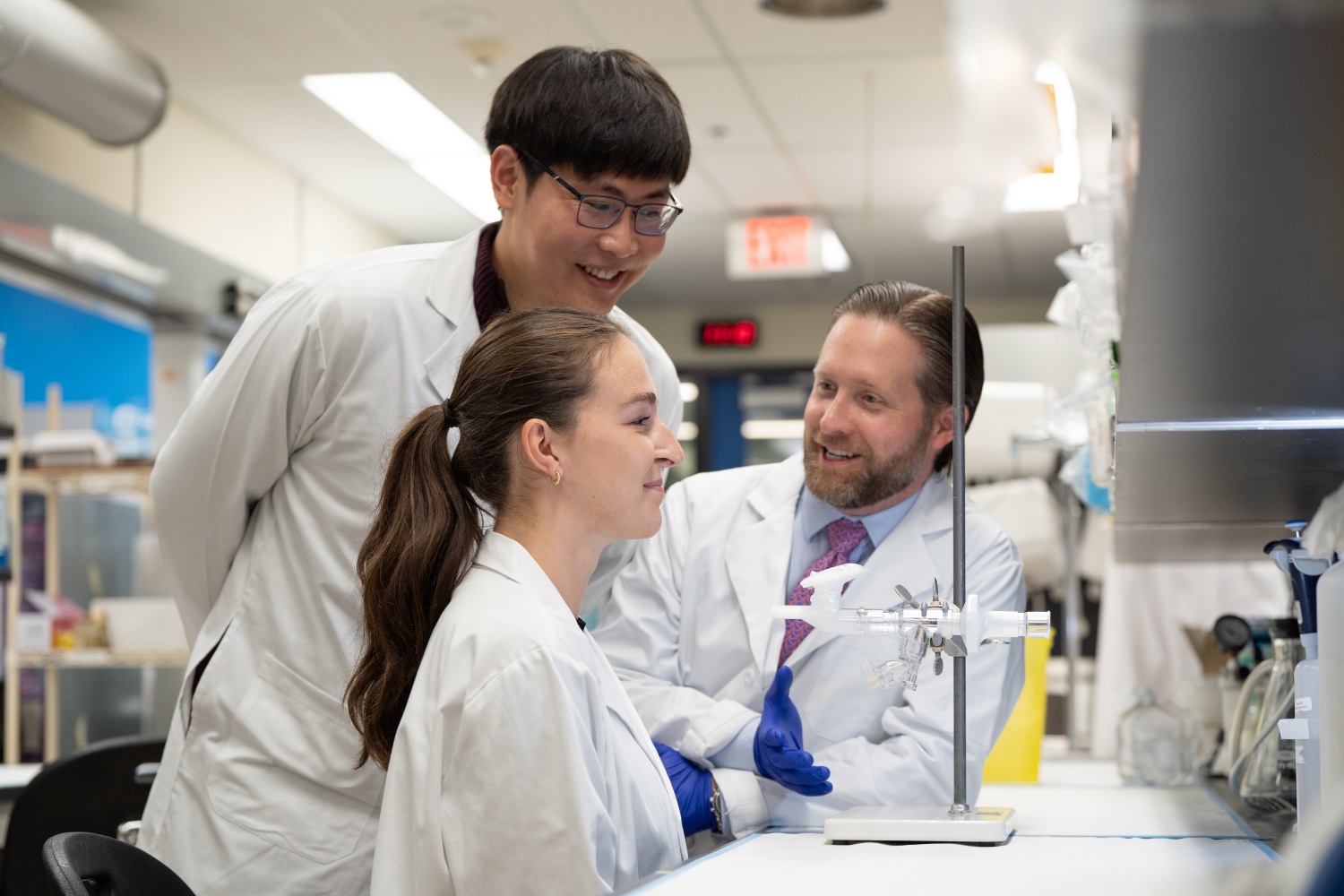
Getting Past “Eureka!”

Ian VanDuzer
Global Nexus at McMaster University is working to close the gap between discovery and impact.
How many times have you read articles with headlines like “Scientists discover possible cure for cancer” or “New drug in lab shows promising cure for infectious disease”?
If it seems like there’s a gap between these headlines and actual, real-world impact, you’re not alone in feeling this way. The path from discovery to a tangible product is never as simple as going from Point A to Point B. The road to invention is fraught with dead-ends, roundabouts, and roadblocks for all products, but especially for health innovations. New drugs and treatments have to pass through dozens of checks – from government approvals, to clinical trials, to commercial viability and social uptake.
Navigating and simplifying that complicated roadmap is the main goal of Global Nexus. The health innovation accelerator, operating out of McMaster University, works to take burgeoning discoveries from university researchers and
industry partners, and help move them through the various stages of development so that the research can have real-world impact.
“We want to ensure that research has impact beyond publications in academic journals, and get it out into the world where it can make a difference in the lives of people,” says Matthew Miller, Executive Director of Global Nexus.
Originally envisioned as a network of multidisciplinary academics collaborating on research related to the COVID-19 pandemic, Global Nexus has since evolved, focusing now on broad health innovations that can curb emerging and existing health threats, infectious or not.
Part of Global Nexus’ mission is to eliminate as many roadblocks as possible on the road to translation.
“A tremendous gap stands between academic discoveries and their real-world impact,” Miller says.
“Global Nexus is committed to addressing that gap, and we’re doing so by bringing together experts from across sectors to ensure greater translation, commercialization, and implementation of the promising ideas born in university labs.”
Global Nexus is diligently working to streamline the processes between research and commercialization. By bringing together experts, pooling resources, and developing partnerships with leaders across many sectors, Global Nexus is continuously moving projects forward.
Among their ongoing projects is a next-generation, made-at-McMaster COVID-19 vaccine, which recently moved into Phase-II clinical trials.

“We’ve successfully moved our inhaled aerosol COVID-19 vaccine to human trials. The results have been very promising so far.”
– Matt Miller, Executive Director of Global Nexus.
The inhaled aerosol vaccine would be the first of its kind – a new way of administering vaccines in an easy, painless way. Designed for COVID-19, the technology has grand implications for the future of vaccinology. If successful, the inhaled aerosol vaccine could signal the end of needle-in-arm vaccines for respiratory infectious diseases. “Instead of needing to see a doctor or a pharmacist, you could potentially administer a vaccine yourself,” says Miller. “It is very exciting, and potentially groundbreaking for how public health is maintained.”
Most of Global Nexus’ current projects are based around infectious diseases, an echo of the recent pandemic. Projects include collaborations with industry leaders Pfizer (on promoting equity and accessibility of vaccines) and Zentek (on using aptamers to combat infectious diseases like COVID-19 and the avian flu). They are also using artificial intelligence methods to combat antibiotic resistance and to fast-track drug discovery.
But that is not the sole focus of the accelerator. In fact, Global Nexus is currently working with a potent anti-neurodegeneration drug candidate, studying a potential anti-cancer compound, and is leading several national biomanufacturing initiatives.
This sort of progress is only possible thanks to Global Nexus’ ability to leverage relationships within McMaster – one of the foremost research universities in Canada – and across sectors.
“Those relationships are always growing”, Miller says. “We welcome further collaboration and conversations with researchers, regulators, community leaders, and commercialization partners alike.”
The form that collaboration takes is different from project to project, Miller explains, but collaboration is always central to Global Nexus’ successes. For example, Global Nexus involves government, community, and industry partners much earlier than most research enterprises do. “Typically, research will go through pre-clinical studies and then get published in a journal, and only then do we start working on approvals and commercialization,” notes Miller.

“At Global Nexus, our focus is on dialoguing with these stakeholders early on so that our initiatives are purpose-built to achieve impact. This substantially shortens the runway from idea to implementation. ”
– Matt Miller, Executive Director of Global Nexus.
This is the sort of foresight that can be difficult to balance for independent researchers, but Global Nexus is able to leverage their connections, resources, and networks to better empower their researchers. And this connection is a two-way street, with Global Nexus empowering biotech companies and industry leaders to access state-of-the art university infrastructure and world leading expertise. Typically, research is pushed out of academic institutions to start-ups and other industry partners. In Global Nexus’ case, however, research is also pulled in.
It’s a model that benefits everyone, and with early successes under their belts, it’s one that should continue for Global Nexus as they work to change the face of Hamilton’s life sciences industry.
And as Global Nexus continues to ramp up its acceleration initiatives, Miller says there will be more and more opportunities for involvement and collaboration. “Global Nexus, as the name implies, is a connector,” he says. “Right now, we have a series of important projects being developed, but there are even more on the horizon. Students, researchers, policymakers, public health experts, industry reps, and community leaders will all be called upon to play important roles in the development of new health products that keep our communities safe.”

See what's possible. Bring your discovery to market.
Related Articles
Related
St. Joe’s prepares to launch a groundbreaking psychedelic medical research centre
"The Centre for Health Innovation and Research in Psychedelics at St. Joe’s is dedicated to advancing the science of medicinal psychedelics. With demonstrated effects on serotonin pathways, neuroplasticity, anti-inflammatory effects and functional connectivity in the...
Alectra Powers Communities Beyond Our Borders
"Alectra Utilities has been honored by the Ukrainian World Congress (UWC) for its generous contribution toward restoring power to Ukrainian schools devastated by Russia’s relentless missile and drone strikes. During a presentation to Alectra’s Board of Directors on...
Hamilton Modular Builder is Helping Address the Housing Crisis Head-on
"The city has chosen a Hamilton-area modular home company to provide the 60 micro shelters that will form a temporary new neighbourhood in southeast London for people with nowhere else to live. Fero International Inc., based in Stoney Creek, builds the modular homes...
